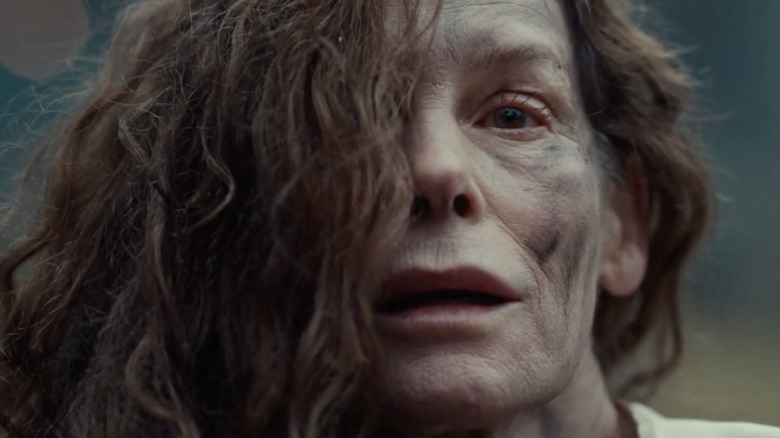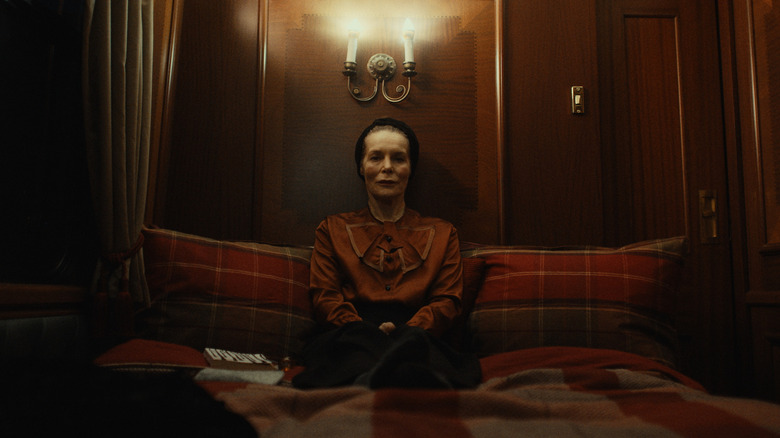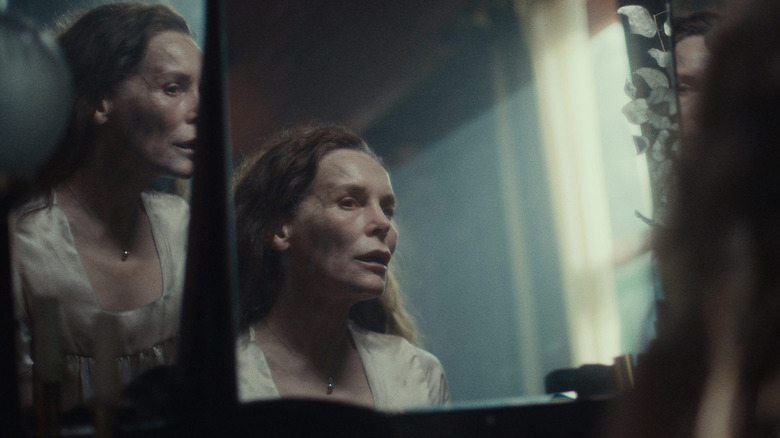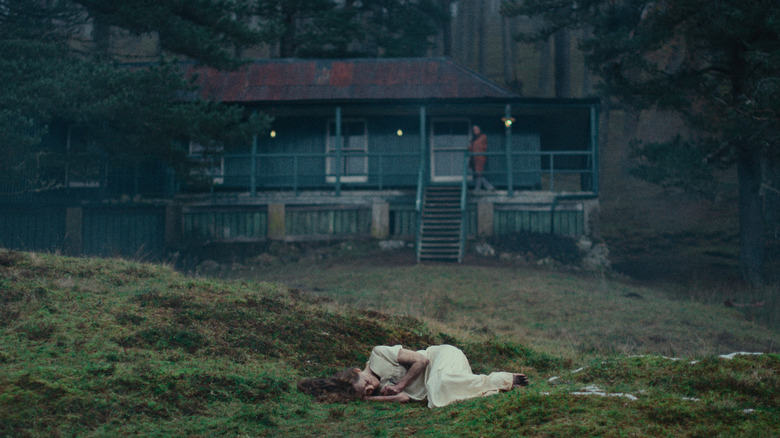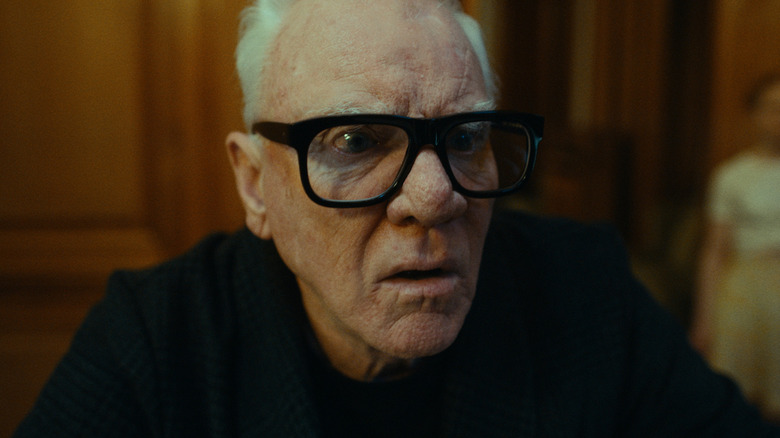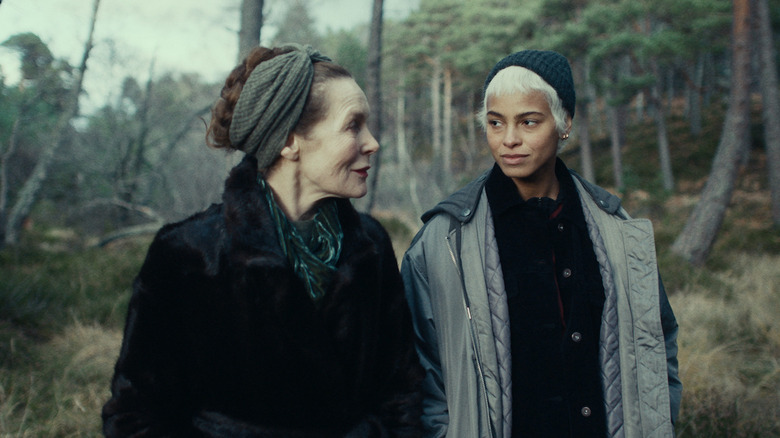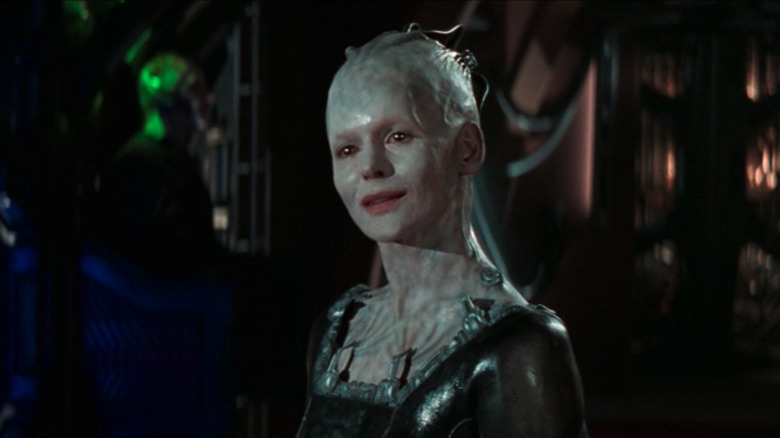She Will's Alice Krige On Her Character, Malcolm McDowell, Star Trek's Borg Queen And More - Exclusive Interview
In a stage and screen career spanning over 40 years, Alice Krige has established herself as an accomplished performer with a mesmerizing presence. Her singular filmography includes characters as varied as singer Sybil Gordon in Best Picture Oscar-winner "Chariots of Fire," the dual role of Alma Mobley/Eva Galli in "Ghost Story" opposite Fred Astaire, the terrifying Witch in "Gretel & Hansel," an unnerving riff on the Grimms' fairy tale, and her indelible turn as the Borg Queen in "Star Trek: First Contact." No matter the role, Krige fully embodies each character she takes on, and the same is true of her latest film, "She Will," a haunting psychological thriller for which director Charlotte Colbert earned the Best First Feature prize at the Locarno International Film Festival.
In "She Will," Krige stars as Veronica Ghent, an aging movie star who travels with her nurse (Kota Eberhardt) to the Scottish Highlands, a place where women suspected of witchcraft were once burned, to recover from a difficult surgery. While there, Veronica starts to draw power from the land, which enables her to confront the trauma she suffered as a young actress at the hands of Eric Hathbourne (Malcolm McDowell), the director whose film made her famous.
Krige is enthralling to watch as Veronica evolves from raw and defensive to empowered and uninhibited. Krige's passion for and meticulous approach to her craft were on full display in an exclusive interview with Looper in which she discussed her character's arc in "She Will," her take on the film's subtle #MeToo message, the fun of working with Malcolm McDowell, and her thoughts on her iconic role as the Borg Queen.
Finding Veronica
You've starred in many horror films and played a lot of disturbing characters, but in "She Will," we find your character Veronica in this very vulnerable state following a double mastectomy. How did you get into her mindset?
It's a very well written, beautifully imagined script. You start with that. It's already given to you in the writing, it's there in the storyline and in the writing. [Director] Charlotte [Colbert] was a hugely inspirational and creative co-conspirator in exploring the terrain of Veronica's psyche.
I researched the actual surgery. I visited websites where women were dealing with both the trauma of cancer and the aftermath and the consequences of the surgery, coping with all the fluid that drains out of the wounds, all of that challenging, difficult stuff, and also coping with the absolute mutilation of your body and what that does to your psyche and your sense of yourself. I read as many conversations amongst women as I could find.
Then I, with my heart in my mouth, called a very dear friend. She and I had been at school together when we were eight and nine, but have remained in contact and remained very close friends. She had a lumpectomy ... I think she witnessed abuse and then experienced it as a child and a teen, and it had a completely different effect on her than it had on Veronica in that she spent the rest of her life fighting for the underdog, fighting for the oppressed, fighting for the wounded ... She is a true survivor and fighter for justice.
I called her and I said, "Could you bear to tell me about your experience?" She said, "Hell yeah, I'll tell you," and she laid it out in graphic detail, the whole process. [It was a] visceral experience for me to hear this, but she left me with something so potent and something that became a symbol for Veronica. The last thing she said was, "You got to rise from the ashes like a phoenix." That was, for me, Veronica's end point.
She didn't know the story [of "She Will"]. She had no idea that what she had said resonated completely with the imagery of the piece. I hope that sentiment might be some solace or comfort for any women who are going through this experience that watch the film.
Krige's career has given her insight into the human condition
One of the interesting things about the movie is that it talks a lot about masks, which is something that Veronica is especially conscious of as an actor, but in certain ways, she becomes more capable of dropping her masks as the movie continues. As an actor, was her struggle to find herself beneath those masks something you could relate to?
With regard to Veronica, at the beginning, she has held that mask so close for so long that it's fused to her. She's become totally trapped by it. She's utterly trapped by the mask of this haughty, distant, arm's length, inaccessible movie star, albeit an ex-movie star, as she wryly comments. She's utterly trapped by it. She can't drop it. It's become who she is, and on an unconscious level, she knows that she's reached the end of the road. She has hit a wall.
With respect to me and masks, my task is to inhabit someone else's psyche. It's a cliché, to stand in someone else's shoes, but it's an extraordinary gift to be given, because after a lifetime of doing it, you arrive at the point where it's impossible to sit in judgment. Being human is a challenge. The great majority of us do the very best we can and we fail daily.
Most of us are doing the very best we can, and she's doing the very best we can, [but] she's painted herself into a corner that is slowly killing her. The mask is killing her. It's reduced her humanity to just a damaged fragment, and then life, fate, whatever it is, takes her on a journey that disintegrates the mask.
Veronica's goal is truth, not revenge
As she develops powers that she uses specifically on bad men, it helps her delve into past trauma that she's deeply suppressed. What were your feelings about the way the movie presents its feminist, #MeToo messages, especially the suggestion that violence can be a path to healing when it comes to Veronica's relationship with Malcolm MacDowell's predatory director, Eric Hathbourne?
I love the way it approached it because it's entirely oblique. It's not full-on, in your face #MeToo. It's quite oblique in the way that it comes to it. Certainly not for a moment did I think for Veronica was looking to exact revenge. He says to her, "What do you want?" And she says, "The truth." This trajectory that she's been on has brought her to a place where she can face what happened full-on.
Right at the beginning of the film, she's post-surgery, she's on her knees, and something flashes up on the television, a program in which she learns that he, Eric Hathbourne, is about to be knighted. He's honored, he's lauded, and he's about to make a remake of the film [that made Veronica famous when she was a child], and there's this image of a line of 14-year-old little girls snaking around the corner, all waiting with their hearts in their mouths to audition and maybe get this role in this iconic movie.
What actually happened [to Veronica when she was a teenager] has never been addressed or spoken about and was so painful that she couldn't look at it. At 14, you always think it's your fault, certainly at that time, and she's punished herself one way or another. Finally, with a mutilated body, she's able to drop her night dress and look at herself in the mirror, and she manages to emerge from a moment of extraordinary truth with herself. She asks him to do the same and he can't, which is why the movie [develops] for him the way it does.
Malcolm does a breathtaking performance. With a very, very short amount of screen time, he manages to paint this human being who has refused to look at himself. There's a moment in the wee small hours of the night when he's sitting at an empty bar in an empty hotel with his head in his hands and I really felt at that moment that Eric Hathbourne, thought, "Yeah, this is who I am. This is what I do, and it's wrong."
Moments later, she shows up and he says, "What do you want?" And she says, "The truth." She has articulated it for herself, but he cannot, which is very interesting. I don't think she is looking for a violent outcome. He brings it upon himself. If he had said, "I'm terribly sorry," I don't think the film would've [gone] for him the way it does.
The joy of working with Malcolm McDowell
What was it like working with Malcolm McDowell in your scenes together?
He's a force of nature. He has no filter. He speaks it as it pops out of his head. He is so funny. You know that twinkle that Malcolm [gets in his movies]? It's him. It's who he is. He can say the most outrageous thing, but he's twinkling away, and you can't help falling in love with him. I was absolutely in the palm of his hand. We had an enormous amount of back and forth and fun. He had everyone flocked around him to hear his endless stream of hilarious stories. He's the master storyteller.
I'd never met him before. I was so nervous. I have the greatest admiration for him as an actor, and my heart was in my mouth as I waited, as I gathered the courage to walk into the trailer where he was having his makeup done on the first day. It was actually hard to speak. He saw me in the mirror and he said, "Alice!" He got up, and he flung his arms around me [laughs] and he gave me this big hug, and he said, "I'm so happy to be here." He's really wonderful. He is not that onscreen persona. Not an iota of him is that.
The thrill of Dario Argento's endorsement of 'She Will'
One of the other cool things about this movie is Dario Argento came on as an executive producer. How did he get involved and what does it mean to have his stamp of approval?
The film was completed, was totally delivered. It was at the first festival that it went to, [the] Locarno [Film Festival]. Wonderfully, Charlotte won [the] director's First Film prize, which was marvelous. Dario Argento was there getting a lifetime achievement award. He was also, for the first time, working as an actor in a film that was being screened at Locarno, so he was there for the duration and he saw "She Will." He loved it so much that he got in touch with Charlotte, I believe, and said, "How can I help you get this film seen?"
There is an exchange and Charlotte was absolutely blown away to meet him and that he should love "She Will." Ultimately, he came on board as an executive producer to help birth it into the world. It's one thing to make a movie; that's 50% of the journey. The next 50% is what we are doing now, which is to get it out into the world and make people aware that it's there, and hope that they will go and see it. His stamp of approval, as you said, really amplifies its worth, and amplifies the number of people who might go and see it because he is associated with it.
Krige 'had so much fun' playing the Borg Queen
I can't let you go without asking you about playing the Borg Queen in "Star Trek." That's a role that you've come back to so many times, most recently, in animated form for an episode of "Star Trek: Lower Decks." What has it meant to you to play a character that's resonated so deeply with people?
It's astonishing, really. I describe and believe that the Borg Queen was the ultimate collaboration. Think about it: You cannot imagine her separate from what she looks like. I couldn't have rocked up and been the Borg Queen, me.
[Makeup artist] Scott Wheeler gave me a gift of such magnitude by giving me that, and Todd Masters made the suit and was instrumental in designing it, so I was given so much. It took eight hours to assemble me, but by the time it was on, I felt as if the Borg Queen had showed up. I really felt as if I was a channel and she rocked up, checked in, did her thing, checked out.
I still feel that no matter how many times they think they've got rid of her, they're kidding themselves. They really can't. She's out there, and every now and then, she chooses to show up and they can do their damnedest, [but] they're not going to erase the Borg Queen.
I can't quite explain it myself, but she's endlessly interesting. There appear to be an enormous number of permutations. Also, it appears that it doesn't matter who plays her, because there have been other actresses who have played the part, subsequent to "[Star Trek:] First Contact." She is elemental.
At the time when I was looking for her, before we started shooting, I reread "A Brief History of Time," and this idea that you're taught at school that energy cannot be created or destroyed, it's constantly transmuted, I thought, "Well, that's her then." She was there from the Big Bang. She's always been there, [but] we weren't aware. She finally showed up. I can't explain the Borg Queen. She's a phenomenon, an entity that is inherent in our universe. I had so much fun. You wouldn't think it was decent to have as much fun as I had playing her.
"She Will" is now playing in select theaters and available for rental and purchase digitally and on demand.
This interview has been edited for length and clarity.
